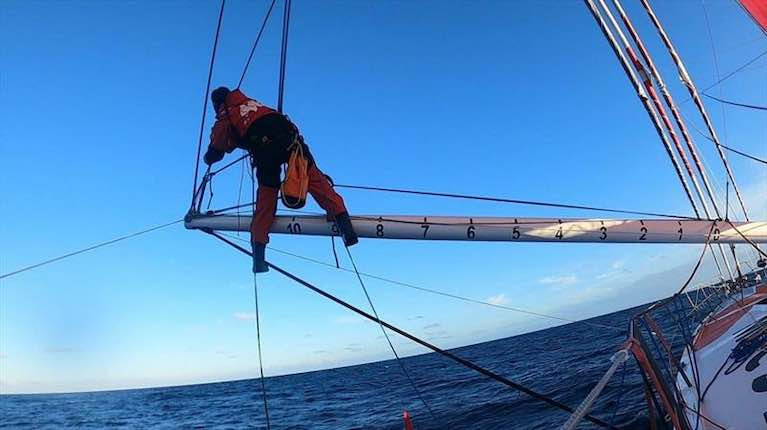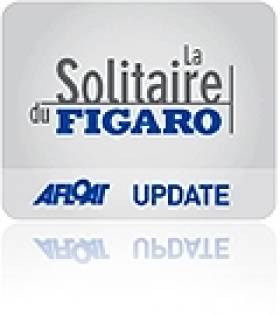Displaying items by tag: Isabelle Joschke
The Franco-German skipper Isabelle Joschke has been forced to abandon her Vendée Globe Race on the 62nd day of racing after a further failure of the keel canting system on board her IMOCA MACSF.
Joschke was lying racing in 11th place racing in difficult conditions, in 30-35 knots of wind in the South Atlantic some 1100 miles east of the Argentinian coast.
During the late afternoon today Saturday 9th January Joschke realised that the hydraulic cylinder which was holding her keel centred had failed. After the main keel canting system failed on January 3rd she had been sailing with the keel centred, held in place by this replacement ram. But the keel is no longer held centred. She immediately lowered the mainsail and was sailing under storm jib to keep the boat as stable as possible.
Alain Gautier, MACSF team manager, explained: “Isabelle is currently taking stock of the situation. She has reduced speed completely to minimise the effect of the waves and to make sure water doesn't get into the boat. The first problem is that she is sailing in the direction of the depression and conditions will deteriorate overnight. Tomorrow a shift in the wind direction should allow her to escape to the north-east to escape this low pressure, and flatter seas should make things easier. It is obvious that Isabelle can no longer continue with her Vendée Globe and will have to retire. We are in constant contact and are studying the various options with her for the next few days."
On Sunday, January 3, the of the hydraulic keel cylinder ram became detached from the keel head so Joschke could no longer cant the keel. A false cylinder was put in place which fixed the keel in the vertical position and it was this cylinder which has now broken.
On the 1800hrs ranking, Isabelle Joschke was in In 11th position, the first woman in this Vendée Globe fleet. She was having a remarkable race, going well In the main ‘peloton’ after dealing with each and every one of several technical problems. She has shown great determination and mental strength but this evening she is devastated to have to pull out of the race when she had sailed 21,224 miles of the race course and had just 5853 nautical miles to sail to the Les Sables d’Olonne finish line.
The 44 skippers taking part to Leg 3 of the Solitaire du Figaro left Brest today for a 349 miles long route bound for Kinsale. The start was hampered by the bulk of the fleet clustering the pin end of the line, causing individual recalls and several protest flags to be raised. Leaving the goulet de Brest prove to be as hard as expected with collisions, penalty turns and a boat actually hitting the rocks. Portuguese skipper, Francisco Lobato, rounded the Radio France mark in 5th position ahead of his fellow first time participants.
Skippers left the pontoons from 11.00 waving goodbye to shore teams, families, friends and supporters ready to embark on the 349 miles of pure competitive sailing to Kinsale, together with La Belle Poule, the French Naval tall ship who hoisted her full set of sails, offering an spectacular and rare show for the gathered public out to watch the start.
Even before the start procedure was given, the atmosphere was full of excitement and expectation. At the start several boats were over the line, some going back to take a penalty and re-start, but the situation was pretty confused and many skipper's decided to hoist the protest flag. At the weather mark, the bouée Seamobile, two boats collided and further penalty turns ensued.
At the Radio France mark, the much-appreciated first prize went to François Gabart on Skipper Macif 2010, who was followed by Thomas Rouxel on Crédit Mutuel de Bretagne and Sébastien Josse on Vendée. Young Portuguese newcomer to the Figaro, Francisco Lobato on ROFF/TEMPO-TEAM had an excellent start to then round the mark in fifth, first among the rookies. Other non French skippers were reported to be in the second half of the fleet: Swiss Bernrd Stamm in 29th, Italian Pietro D'Alì in 36th, Jonny Malbon in 39th and Franco/German Isabelle Joschke in 43rd.
Shortly after rounding the Radio France buoy, Gabart ran onto the rocks whilst sailing very close to shore. He was forced to get off the boat and was then able to literally push the boat off the rocks without requesting outside assistance and immediately went back to racing.
Upon leaving Brest and the bay of Camaret, the fleet made course up to the Four Channel, which can prove to be a very complex stretch of the course, especially renown for the tough cross currents. The Molène archipelago and the isle of Ushant will have to be left to port side, then the Portsall plateau leaving the cardinal mark west Grande Basse de Portsall to port side. The leaders could get there, according to the latest ETA tonight between 8 and 9 p.m.
The fleet will then begin the second part of the leg that will take the skippers across the Channel towards Wolf Rock, which must be left to port. The fleet is expected to reach Wolf Rock around breakfast time Tuesday.
Kinsale will welcome the 2010 Solitaire du Figaro for the 19th time in the 41-year history of the classic summer race, the highest number of visits received by any venue to have hosted the race stops.
Quotes from the skippers in Brest, before leaving for Leg 3
Pietro D'Alì (I.NOVA.3)
"This is not going an easy leg but at least it's going to be fast. The latest weather report says there will be more wind that we thought, so it will probably less hard to get out of the gulf. The cold front will come later than expected, there is a chance that we will round Wolf Rock reaching and then a long upwind part to the Fastnet. The wind will be pretty instable after that, we will need all our focus tacking up to Kinsale. The finish is expected for Wednesday might, it's going to be pretty quick... You will have to stay in the leading group from the start, not to accumulate too much distance, as apparently there will be no stop and go this time. I feel all right, especially after a massage and a good dose of sleep, I'm ready to go for the third one. I hope I will have the chance to fight to be in the top ten."
Armel Le Cléac'h (Britair)
"Sure, it's the shortest one, but we will be busy anyway. Getting out the goulet de Brest (bottleneck harbour) this afternoon against the current won't be easy, then the long tack to Cornwall, speed needed there, and the Celtic sea to complicate things further. Not simple at all, we'll have to watch out. As in any other leg... you can loose ground and be left behind. The start is tricky but the rest as well, with many options to take. I'm a bit tired, that's true because you never recover 100% of your energies. We are midpoint now with a tricky leg to be dealt with. And it's not just all about speed, but there's also strategy, weather routing and we are under stress."
Jean-Paul Mouren (Marseillentreprises)
"I'm convinced it's going to be a good leg, as the previous ones. It will probably be less sunny when we'll get to Ireland; I have my umbrella ready... My wish? You know, choosing the right option or the wrong one takes exactly the same energy, so I will try and be on the right track, be at one with the weather. That's what you need to do, be on the same wavelength with nature, or it's going to be all wrong."
François Gabart (Skipper Macif 2010)
"We had two good ones, I must admit I'm biased because all went well for me. And for this one, we have all the right ingredients: light wind and current, then reaching under spinnaker or genoa; the Celtic Sea is going to be interesting too because there is a small secondary low pressure and there will surely be wind shifts to consider. Then another ridge and another front. A full plate for the game to be fun. I'm happy to get going because I feel all right, the boat is ready and I guess I got the rhythm. I need to go on sailing like I did on the previous two legs: look for maximum speed and try to be at the right place at the right moment."
Marc Emig (Marcemigetmoi.com)
"I need to learn to sail in the rain! More seriously, I wish to be able to stay in the top group, not to give up when things go wrong, be back in the match and get to Kinsale in a good mood with the longest possible lead. Then I will still have the last leg to try a coup and go up some 5 or 6 places."
Preparing for La Solitaire du Figaro here
Latest news for La Solitaire du Figaro here






























































